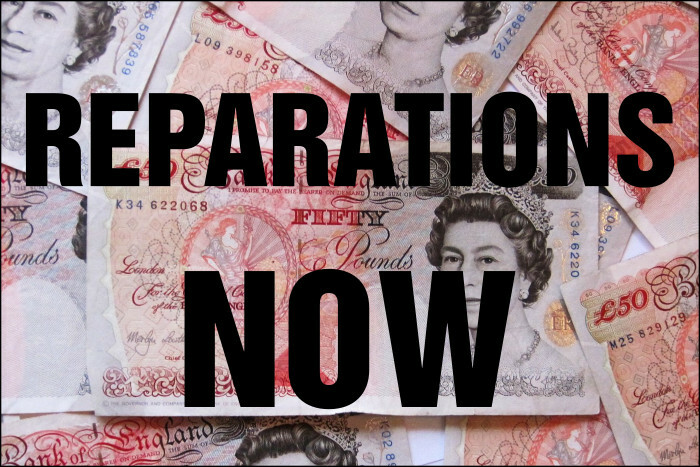Andrea Gilbert, IWW BAME Officer
The murder of George Floyd in the US shocked the world and started an international wave of mass protests against Police brutality and Racism towards Black people. The officers were all arrested and charged for Floyd’s Murder. Like most of the world, the UK still has entrenched structural racism, and tensions with the Black community have been rising during the COVID-19 pandemic due to the Police stop and search laws. In June 2020 22,000 Black men were stopped and searched – a quarter of Black males in the UK. Since 1990, 1,731 people have died in police custody with barely any officers being prosecuted or sacked from their role. The toppling of Edward Colston statue combined with the Government acknowledging the disproportionate deaths within the Black and South Asian community during COVID has led UK organisations and institutions to start looking at their shameful role in the Transatlantic slave trade.
The Windrush scandal saw the Tories’ Draconian policies target people who were invited to come to help rebuild the UK after the second World War – they were taken to detention centres for long periods of time, or sent back to countries such as Jamaica and Trinidad which they had no connections to. These saw people lose their jobs, homes and access to services such as the NHS, which led to deaths due to people not being able to seek treatment. The Government held a review but did not bother to implement the recommendations, until forced to after the Black Lives Matters protest started. A compensation group was set up by the Government for those affected by the scandal. People have been paid a measly £22,000 on average, which is unacceptable considering what was lost. Others have passed away before they could even receive a payment. The Government so far has paid out just under a million pounds.
Reparations talks have been happening over the years from the European countries involved in the Transatlantic slave trade, which saw 12 million Africans taken away from Africa to work in plantations in Brazil, Caribbean and North America. Last June, the CARICOM Reparations Commission (CRC) launched the 10 Point Plan for Reparations: demanding that Europeans stop apologising for the slave trade and to pay the Caribbean for 200 years’ worth of labour.
The effects of slavery is still felt today in the Caribbean due to the lack of resources available in Education, Health and Technology. The CRC believe It is time the European governments involved support the Caribbean development fund – like the US does – to ensure that the Caribbean can develop in the future. The St Vincents president, current CRC and CARICOM leader, has asked for support from the African Union for the 10-point plan, and to forge a working relationship between the Caribbean and African unions to promote Trade and fight the Climate Crisis.
The US have already started the process of making demands for Reparations for African Descendants. In January 1989 US Congressman John Conyers of Detroit introduced the Bill H.R 40 “Commission to study Reparation proposals for African Americans Act”. This piece of legislation represents a crucial milestone in the long struggle for Reparations in America. John Conyers has reintroduced the bill in Congress every year since its release. The National coalition of Blacks for Reparations in America ( N’Cobra) was formed in September 1987. The group is a mass- based coalition for the sole purpose of obtaining reparations for African Descendants in the United States. Since the launch of the CARICOM Commission in 2013, talks about Reparations have been re-energised – which has inspired the creation of national African-American Reparations commision, the European Reparations Commission, and similar groups in Canada and the UK.
In the UK, British organisations and institutions made a lot of money out of the Transatlantic slave trade some were even formed in this period. The majority of them are banks such as Royal Bank of Scotland, Barclays, HSBC and Lloyds Banking group. The brewery Greene King was set up by an apprentice at the Whitbread Brewing Firm called Benjamin Greene, who inherited estates in St Kitts and, like many, profited as an absentee enslaver. Greene went on to become one of the 4,000 enslavers who were compensated: received £4,000 (£270,000 in today’s money) for 1,396 enslaved Women and Men in St Kitts and Montserrat. A number of higher education institutions which had a role in slavery, such as Oxford’s Oriel College, and Glasgow University, have pledged to support the Caribbean and set up research funds with the University of West Indies.
The IWW union can support the demands of the John Conyers January 1989 Bill by holding the organisations who profited from the Transatlantic slave trade to account by urging them to pay Reparations. The inequalities of slavery have never been addressed, and exploitation of the developing world and propagation of racism under capitalism continues.
